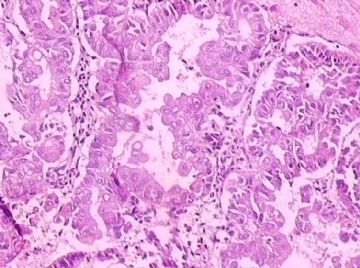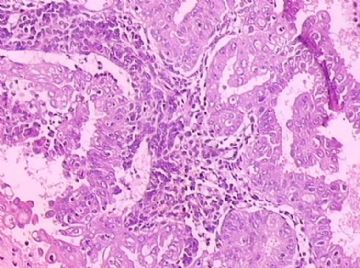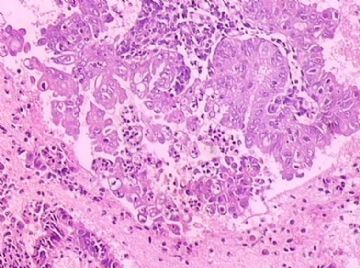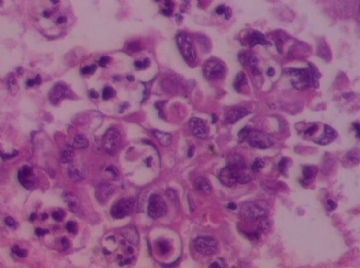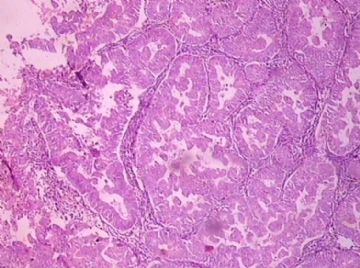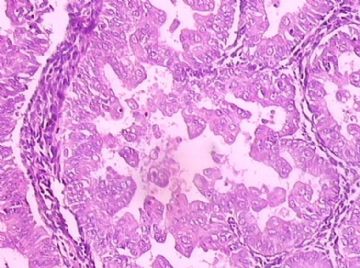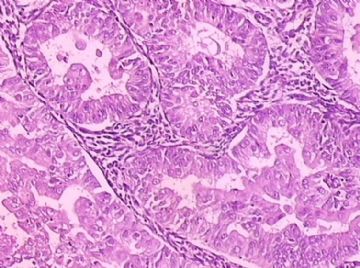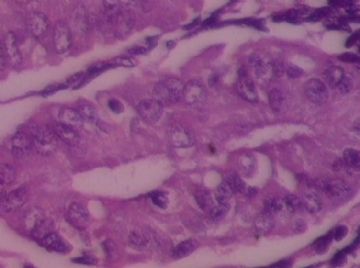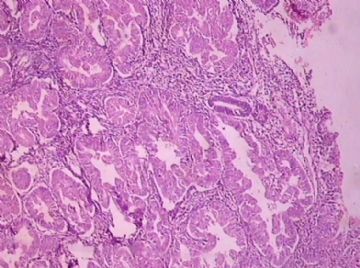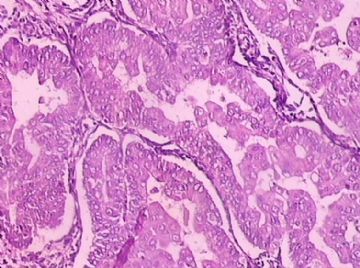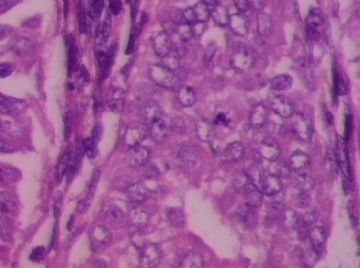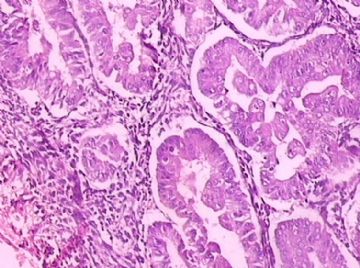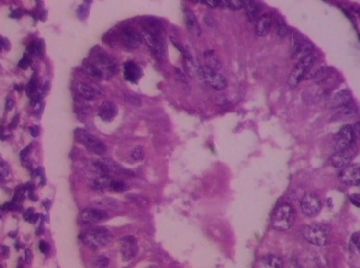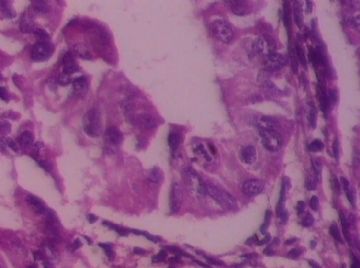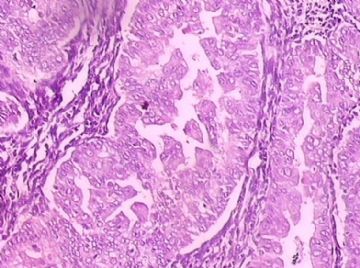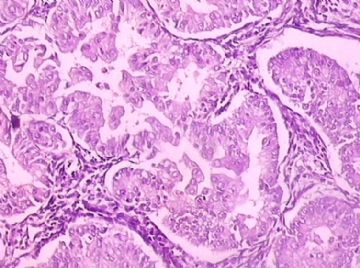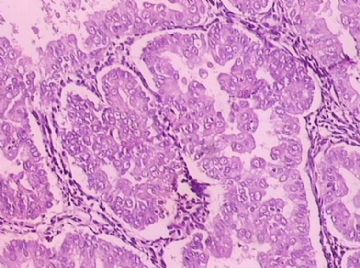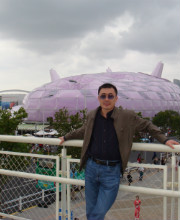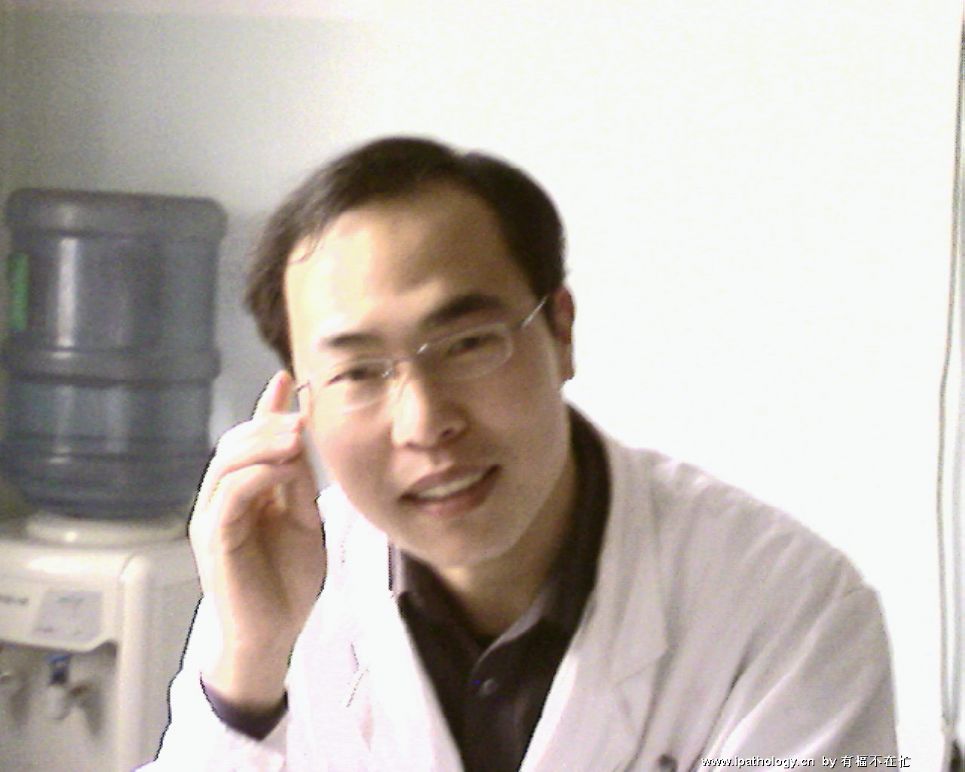| 图片: | |
|---|---|
| 名称: | |
| 描述: | |
- B172344岁子宫内膜标本,请各位老师会诊,谢谢
| 姓 名: | ××× | 性别: | 女 | 年龄: | 44 |
| 标本名称: | 刮宫标本 | ||||
| 简要病史: | 阴道不规则流血20天 | ||||
| 肉眼检查: | 灰红组织一堆,直径3厘米 | ||||
-
本帖最后由 于 2009-05-14 20:36:00 编辑

- 努力的工作,快乐的生活!
相关帖子
-
本帖最后由 于 2009-05-18 22:18:00 编辑
主观性太强的诊断其实无所谓谁对谁错. 你说是癌我没意见,说非典我也认同,只要各自能说出各自的理由
最重要的是和临床做好沟通.并且了解你们医院这两种诊断各自临床的处理.
我觉得这个诊断挺好:非典型复杂性子宫内膜增生,不能排除高分化子宫内膜样腺癌。
另几个观点
缺乏肌层浸润不能除外癌的诊断-30% 的癌可能局限于子宫内膜
子宫切除标本子宫内膜内癌和非典型性增生的鉴别是学术性的
在绝经后妇女的刮宫标本中区分两者没有实际意义
注意腺体的复杂性(筛状结构)以及核的多形性和突出的核仁
诊断癌的特征是(Cancer 1982;49:2547):
腺体不规则浸润伴有间质的纤维组织增生性反应
复杂而融合的腺体和筛状结构
广泛的乳头状结构,乳头具有血管轴心

- 蚕不知道自己会变成蛹,蛹不知道自己会变成蝶,当我们化羽成蝶的时候,就会发现那段变化的岁月是多么珍贵。
| 以下是引用杨斌在2009-5-18 2:20:00的发言:
I basically agree Drs. Zhao and Yu's comments. Based on the photos provided, I have no problem for "Atypical complex endometrial hyperplasia". However, I do not see definitive frankly carcinoma in those photos. The patient's age is relatively young. If she is not postmenopausal, she should have other clinical manifestations which place her in high risk group for endometrial carcinoma, such as severe obese, polycystic ovarian syndrome, ovarian mass (such as granulosa cell tumor) and long time anovulatory cycles due to other ovarian diseases. If clnically this women is free of high risk factors, then you should be very cautious to make diagnosis of "carcinoma" with a borderline morphology like this case. Therefore, with no further clinical information support, I will diagnose this case as: ATYPICAL COMPLEX ENDOMETRIAL HYPERPLASIA, CANNOT RULE OUT WELL DIFFERENTIATED ENDOMETRIAL ADENOCARCINOMA. In most clinical situations in our hospital, patients with my above diagnosis will first go through progestin-based hormore therapy. If patient is continous bleeding after hormone treatment, she will have the second endometrial biopsy to reevaluate. Up to 80% of CAH and 50% of well differentiated carcinoma will resolve after hormone treatment. If atypical complex hyperplasia persists, regardless if you see carcinoma or not on second bopsy, GYN oncologists will advise patients for total hysterectomy. However, I do not know if in your hospital, gynecologic oncologists will follow the similar approaches. For the sake of patient's benifit, a little conservative approach with communication with clinicians is my advice for this case. |
我基本同意Zhao和Yu的意见。根据提供的图片,对“子宫内膜非典型复杂性增生”的诊断我没有疑问。然而,在这些照片中我没有看到明确的癌。病人年龄相对年轻。如果她不是绝经后女性,她应有其它的临床表现如重度肥胖,多囊卵巢综合症,卵巢肿块(如粒层细胞瘤)和长期因其它卵巢疾病而致的无排卵月经,而这些表现可使其处于子宫内膜癌高危险性状态。如果临床上该女性没有这些高危险因子,那么你对这例的交界性形态做出“癌”的诊断要非常小心。因此,没有更多的临床信息支持,我的诊断将是:非典型复杂性子宫内膜增生,不能排除高分化子宫内膜样腺癌。
在我们医院,多数情况下做出上述诊断的病人先要进行孕激素治疗。如果病人在激素治疗后持续出血,她则需要行第二次子宫内膜活检。近80%复杂性非典型增生和50%高分化子宫内膜癌可在激素治疗后消退。如果非典型复杂性增生持续存在,不管在第二次活检中是否有癌,妇产科医生都将劝病人进行全子宫切除术。然而,我不知道在你们的医院妇产科医生是否进行相同的诊疗程序。从病人的利益出发,我的意见是与临床医生协商,对这个病人进行保守治疗。
| 以下是引用cqzhao在2009-5-18 0:48:00的发言:
Quickly review the discussion above. Young pathologists need to pay attention two things 1) Never mention carcinoma in situ or no myomytrial invasion in em bx ir EMC specimen. 2) Do not write your comment about treatment of focal carcinoma if you do not want to get the law-suit. The women with focal ca in bx or EMC may have deep myometrial invasion. Some gynecologists and women may agree to have hysterectomy for older women with complex atypical hyperplasia Pathologists should observe the priniciple. 译文:快速看了上面的讨论,年轻的病理医生需要注意两个问题: 1)不要在子宫内膜活检或刮宫标本中做出原位癌或没有肌层浸润的诊断。 2)如果你不想惹上官司,就不要在报告中写出局灶性癌的处理意见。在活检或刮宫标本中伴有局灶性癌的妇女可能有较深的肌层浸润。一些妇科医生和女性可能同意对复杂性非典型增生的老年女性性子宫切除术。 |
Quickly review the discussion above. Young pathologists need to pay attention two things
1) Never mention carcinoma in situ or no myomytrial invasion in em bx ir EMC specimen.
2) Do not write your comment about treatment of focal carcinoma if you do not want to get the law-suit. The women with focal ca in bx or EMC may have deep myometrial invasion. Some gynecologists and women may agree to have hysterectomy for older women with complex atypical hyperplasia
Pathologists should observe the priniciple.
I basically agree Drs. Zhao and Yu's comments. Based on the photos provided, I have no problem for "Atypical complex endometrial hyperplasia". However, I do not see definitive frankly carcinoma in those photos. The patient's age is relatively young. If she is not postmenopausal, she should have other clinical manifestations which place her in high risk group for endometrial carcinoma, such as severe obese, polycystic ovarian syndrome, ovarian mass (such as granulosa cell tumor) and long time anovulatory cycles due to other ovarian diseases. If clnically this women is free of high risk factors, then you should be very cautious to make diagnosis of "carcinoma" with a borderline morphology like this case. Therefore, with no further clinical information support, I will diagnose this case as:
ATYPICAL COMPLEX ENDOMETRIAL HYPERPLASIA, CANNOT RULE OUT WELL DIFFERENTIATED ENDOMETRIAL ADENOCARCINOMA.
In most clinical situations in our hospital, patients with my above diagnosis will first go through progestin-based hormore therapy. If patient is continous bleeding after hormone treatment, she will have the second endometrial biopsy to reevaluate. Up to 80% of CAH and 50% of well differentiated carcinoma will resolve after hormone treatment. If atypical complex hyperplasia persists, regardless if you see carcinoma or not on second bopsy, GYN oncologists will advise patients for total hysterectomy. However, I do not know if in your hospital, gynecologic oncologists will follow the similar approaches. For the sake of patient's benifit, a little conservative approach with communication with clinicians is my advice for this case.

- 不坠青云之志,长怀赤子之心
-
本帖最后由 于 2009-05-15 19:35:00 编辑
it is not an easy case only based on the photos. Agree with above evaluation, especially from Dr. njwbhuang.
There are no questions for diagnosis of complex atypical hyperplasia, based on the complexicity of proliferation and cytologic atypia. The key for this case is if local carcinoma is present. Focal atypical proliferation with papillar structures seems large than 2 mm.
I favor a diagnosis: Focal endometrioid adenocarcinoma in the background of complex atypical hyerplasia.
如果仅仅看图诊断,这一例并不容易。同意上述分析,特别是Dr.njwbhuang。
根据增生的复杂性和细胞学不典型性,诊断复杂性增生没有问题。本例的关键问题是有无局灶癌的存在。伴乳头结构的局灶性不异型增生似乎大于2mm。
我的倾向性诊断:局灶子宫内膜样腺癌位于复杂性不典型增生背景中。(abin译)

